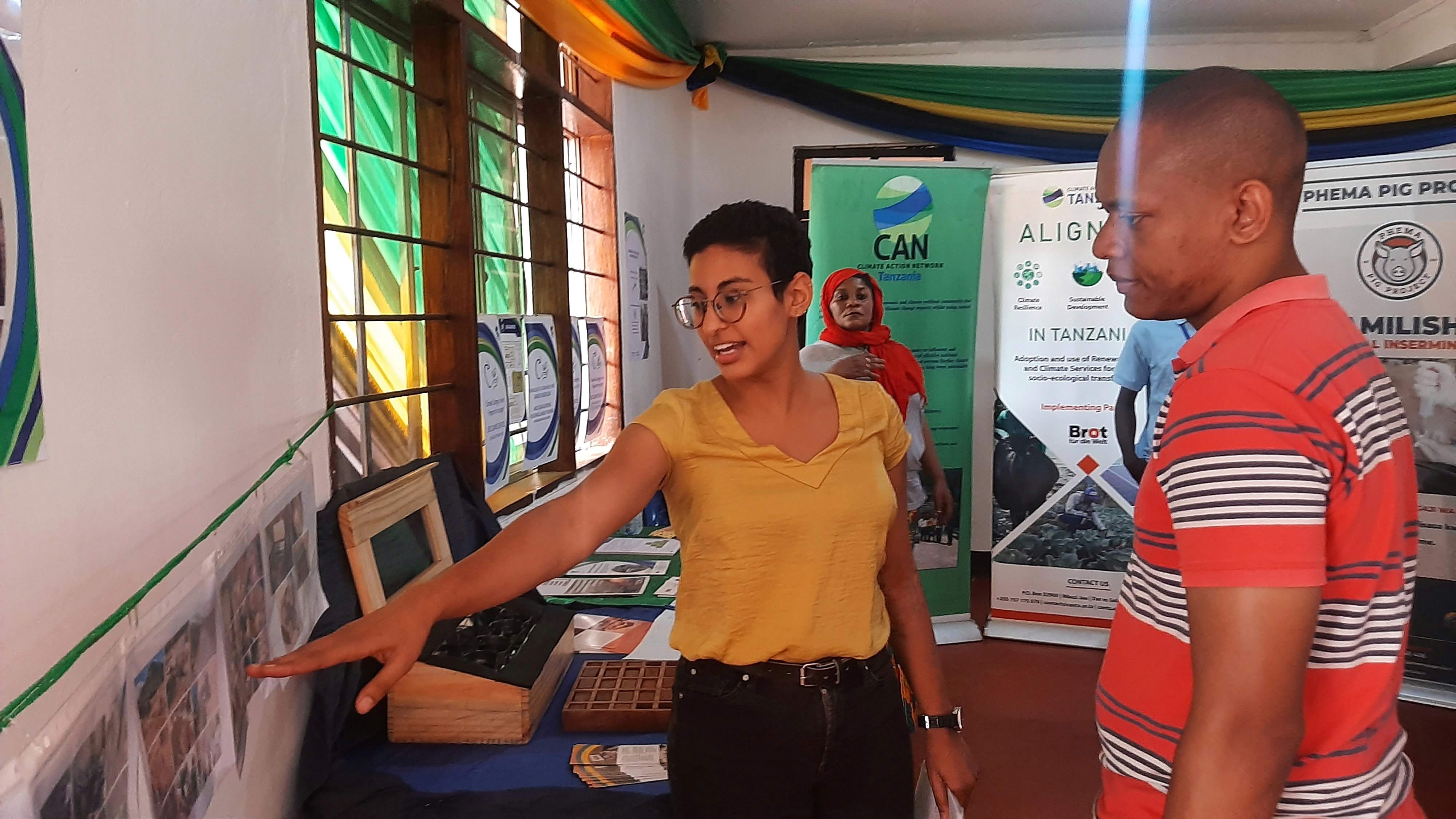
Published: AUGUST 10, 2022
We need the best-available knowledge to tackle the challenges of climate change. Sharing knowledge is key to building climate resilience communities, prepared to take climate actions. On NaneNane, Tanzanians come together to exchange innovations, best practices, and newly implemented solutions. Therefore, we saw the Nane Nane exhibition in Morogoro as the right time and place to share our lessons learnt from our projects in the field. We were guests at the Banda of the Bagamoyo district to present a running project in the region on SMS-based climate services and also, showcase Shamsi-TZ, a low-cost solar cooking, baking and drying solution, developed in collaboration with local communities. Solar cooking and climate services are best practices of how to rethink daily activities under the pressure of intensifying climate impacts. With climate services, we want to empower farmers, fishers and pastoralists to adapt their daily activities to build climate resilience. Good climate information is hard to get. It is difficult to understand, how the changing climate impacts daily livelihood activities, so farmers, fishers and pastoralists struggle to adapt to climate challenges. Preparing for climate challenges such as droughts, diseases, uncertain rainfall patterns or saltwater intrusion requires a solid basis of information to make smart decisions. We showed at NaneNane how we share climate information in Bagamoyo with weekly SMS. We sent SMS to farmers informing them about the predicted weather and giving tips on how to react to the weather forecasts. Additionally, we train extension officers in interpreting climate information and adaptation strategies. Farmers, fishers and pastoralists in the project region can now write us an SMS or ask their extension officers to get support in planning to get resilient. The visitors at NaneNane were curious and eager to learn about Climate Services and Adaptation strategies. Farmers from the project region decided on the spot to try the new solution and signed up to try the SMS Service. Many reported that they are facing multiple climate challenges and are unsure how to respond.
While climate impacts challenge the communities to build resilience still globally ongoing and rising emissions toughen these challenges. The use of energy has to shift away from fossil fuels and the unsustainable use of biomass. Tanzania has a high potential for renewable energy but it still remains largely untapped due to high investment costs. In specific cooking is still dominated by the use of charcoal and gas. Solar cooking proved to be a viable alternative but many solar cooking solutions fail to scale because of the high prices of high-tech solutions with expensive materials, difficult to build locally. The Shamsi-TZ project presents an alternative approach to solar cooking: low-tech and low-tech.
To learn hands-on we presented a model of a new solar cooker, developed by Shamsi-TZ, to the interested visitors. Cooking without burning charcoal or gas combines benefits for health with benefits for climate and environment. Beyond the model of Shamsi TZ is also locally produced, based on low-tech and local materials. This approach allows local communities to adopt the approach easier and get the innovation for a low cost. The visitor explored the solar cooker together with the inventor of Shamsi-TZ. They were excited about a solution that works without gas because gas is becoming more and more expensive.
We also learned a lot from the showcased solutions and innovations at Nane Nane. Farming sea cucumber and seaweed together can diversify livelihoods in coastal regions. Due to climate change fishing gets more and more challenging and fishers look for ways to stabilize their income. In the Banda of Bagamoyo local communities showed how they produce local products from seaweed such as soap, juice or oil. In the Banda of Dar-Es-Salaam farmers presented ways to cope with post-harvest loss. Low-tech cooling systems such as charcoal coolers prevent harvest loss by conserving the products at low temperatures long enough until they can get sold or used. The spread of diseases, high temperatures and impacts on the transport infrastructure are drivers of post-harvest loss that get more and more intense due to climate change. Apart from cooling the farmers showed that drying is also a good approach to conserving sensitive harvest. Especially fruits, such as mangos and ananas can be easily conserved. Many more best-practice where presented ranging from aquaponic to drip water irrigation. Nane Nane showed us tangible how sharing knowledge and learning together is the key to building resilient communities. Let’s keep sharing what we learn.
